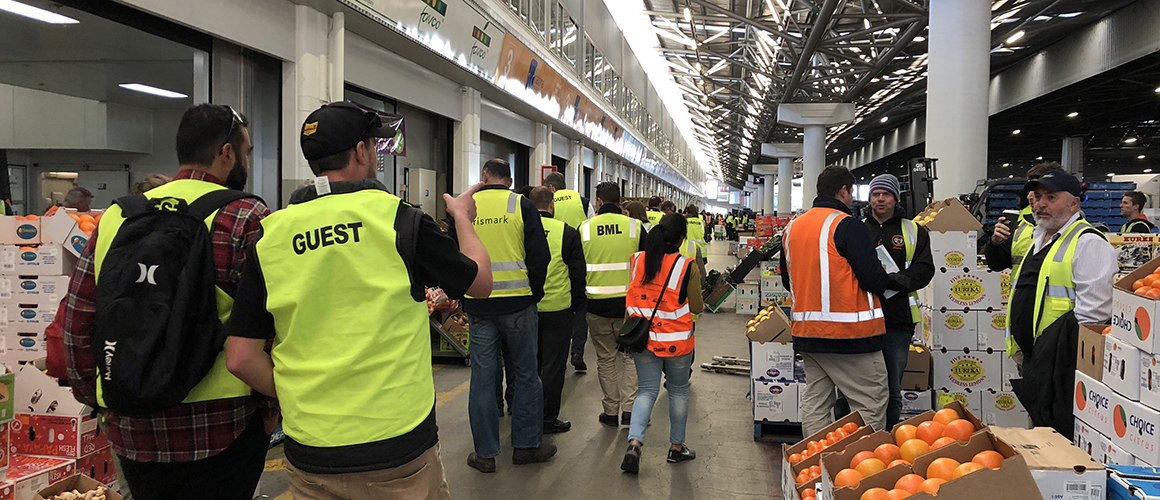Horticulture Field Day takes delegates on a tour of south-east Queensland
It was an unusually chilly start to the Horticulture Field Day at Hort Connections 2018 in Brisbane on Monday 18 June, where around 60 growers and industry members took advantage of the opportunity to visit fresh produce markets, agribusinesses and leading vegetable farms in south-east Queensland.
Brisbane Produce Market and John Deere Australia Headquarters
The first stop for the day was a guided tour of the Brisbane Produce Market, which spearheads the marketing and distribution of wholesale fresh fruits and vegetables in Queensland. With fresh produce on display from across the country – even salad mix from Gippsland – participants witnessed the creative ways that wholesalers displayed produce for sale.
The addition of a new roof has created an all-weather trading environment for the market and there are plans to expand the warehouse capacity and develop new opportunities for wholesalers. Participants also learnt how buyers can sign up to a credit service which avoids the need for cash transactions. Following the recent floods in Brisbane, all electrical infrastructure was raised above the existing peak flood levels to allow for continuity in the event of another flood.
After breakfast courtesy of Brisbane Markets, participants visited John Deere Australia’s headquarters in Crestmead. A short presentation highlighted how the company has transitioned from its humble beginnings as the developer of the self-scouring plough in 1837 to a leading provider of machinery and other services. Participants gained an insight into John Deere’s vision for the future of agriculture, where traditional farming practices will evolve into precision agriculture and decision-making will be conducted in real time at the plant level. The group also enjoyed the opportunity to visit the showroom and get up close to some of the green and gold machinery on display.
Stakeholder presentations
As the field day continued on to Gatton in Queensland’s Lockyer Valley, participants heard short presentations from the Department of Agriculture and Water Resources’ David Burns, who provided an overview of horticulture exports and the intricacies of developing market access for Australia’s key vegetable export commodities. He noted recent success stories in terms of market access, including carrots to Taiwan, capsicum to New Zealand, increased vegetable commodities to South Korea and seed potatoes to Indonesia. David added that the department prioritises market access requests in conjunction with Hort Innovation and advice from industry bodies.
Cherie Gambley from the Department of Agriculture and Fisheries, Queensland also provided an overview of a new strategic levy investment under the Hort Innovation Vegetable Fund, which focuses on area wide management of vegetable diseases. Cherie explained this national project will begin with disease surveys that will ensure the information gathered is most relevant to the industry. Cherie encouraged all stakeholders to get involved in the project to ensure it provides maximum value to the vegetable industry.
Image gallery: Horticulture Field Day at Hort Connections 2018
Farms in focus
The next stop was Windolf Farms, which produces a range of vegetables throughout the year including broccoli, parsnips, potatoes and lettuce. Participants were given a tour of the 750-acre farm and witnessed a range of crops in the field as well as lettuce being harvested.
Participants were impressed with the cleanliness and tidy presentation of the farm, which included a dedicated washdown facility for farm equipment. Participants were then able to visit the packing shed to see broccoli being sorted, graded and packed for shipping.
The final stop for the Horticulture Field Day was Koala Farms – home of the Hort Connections 2017 Grower of the Year Anthony Staatz – which produces iceberg lettuce, baby cos, broccoli and cauliflower. Koala Farms produces its own transplants for quality control and production requirements, and participants witnessed how the seedling trays are washed and prepared for germination. The group also learnt about the farm’s impressive nursery structure, which can be tailored to create different growing environments.
Given Queensland’s warmer climate, these structures act as a retractable cooling house rather than a greenhouse to regulate the plant environment, soil temperature and transpiration rate. The roof can close within two minutes in a sudden weather event and can automatically close in colder weather to retain heat. Participants were impressed with the uniformity of the plants within the nursery, and also visited a nearby field to see baby cos being planted.
After an action-packed itinerary, participants returned to the Brisbane Convention Centre to prepare for the official opening of Hort Connections 2018.
AUSVEG would like to thank Brisbane Markets, John Deere Australia, Windolf Farms and Koala Farms for giving up their valuable time to meet with participants during the Horticulture Field Day.
This post appeared in the AUSVEG Weekly Update published 26 June 2018. Subscribe to the Update using our online form to receive the latest industry news in your inbox every week!














